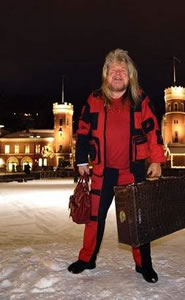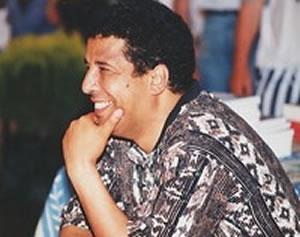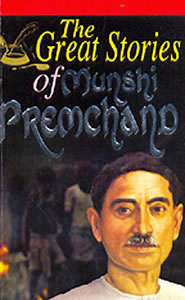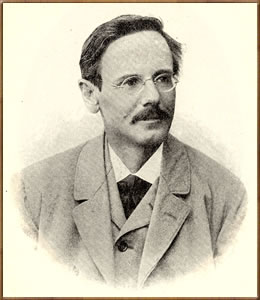|
De Noorse dichter Triztán Vindtorn werd geboren als Kjell Erik Vindtorn in Drammen op 31 juli 1942. Zie ook mijn blog van 31 juli 2009.xml:namespace prefix = o ns = "urn:schemas-microsoft-com:office:office" />
Blue Pictures on a Green Easel
your ocean compass is bathing in sunshine
and the prow is digging into
white sand before stopping ..
no footprints left by naked feet here
nor any bird carcasses dissolved in salt
only wet flapping sails clapping you on your back
and wind across your sun-burned shoulders ..
the Tristan albatross is still hovering over the mast-top
polishing its scientific gaze against the surface of the sea
this ocean on eternity's ball bearings
and rocks worn round and shaped by wavy fingers ..
you stand at the shores of your own body
feeling the tide rise in your eyes
while you observe the lonely coconut
which the ocean has brought here from another shore ..
maybe cut loose with a sharp machete
or chewed into freedom by the dentures of the wind ..
there is no tsunami on its way into this island kingdom
do these micro-continents know each other's names?
you wonder while time becomes a large strange bird
across the same ocean which answers its own echo
and rolls on with its sleep-walker's heart intact ..
your skin desert drinks this all-embracing blue
waiting for the night to light its diamonds

Triztán Vindtorn (31 juli 1942 - 4 maart 2009)
Volgens de Franse Wikipedia is de Algerijnse, Franstalige schrijver Ahmed Zitouni geboren op 31 juli 1949 in Saïda, Algerije. Zie ook mijn blog van 31 juli 2007 en ook mijn blog van 31 juli 2008.
Uit: À mourir de rire
Ils ont envahi ma cellule, ces salopards. Sans se gêner ni s'excuser. Ils ont pris possession de mon dernier univers. Ils l'ont occupé. Dieu, ce qu'ils sont nombreux! Une horde indisciplinée, on dirait une procession entière.
Ils sont entrés dans ma cellule. Tranquillement. Calmement. Presque naturellement. je ne peux rien dire, c'est leur droit le plus absolu. Ils représentent la justice, ou, pour mieux dire, ils sont la justice. Ils mettent en scène ses différentes manifestations, en somme.
Ils vont et viennent dans cette cellule que je croyais mienne. Affairés et polis. Je me demande pourquoi ils ont tant de respect pour moi. Ce protocole ! Cette pompe administrative ! Tout ce beau monde ! Ce groupe de représentants de l'ordre presque pour moi. Moi seul. Moi qui n'ai rien demandé. Ce n'est pas facile à comprendre. Ils sont là, pour moi, tous ces Messieurs. Et si, tous, ils font semblant de faire quelque chose autour de moi, c'est leur manière de s'occuper de moi... lointainement. Une façon comme une autre " d'alléger mes derniers moments ", probablement ! S'ils pouvaient savoir combien ils me sont indifférents et combien je les ai méprisés avant ce moment... Mais, passons ! Il faut rester sérieux ! Faire comme le mourant qui écoute sonner la cloche de sa dernière heure, une heure qu'il attendait depuis longtemps. Beaucoup de sérieux. Et surtout rester calme quoi qu'il arrive. Ne pas paniquer. Encore moins, improviser. D'ailleurs, au point où en sont les choses, à ce stade presque final de mon existence, je n'ai pas le choix ; seulement celui d'aller au bout de mon choix. Aucune possibilité à regretter. Même si je voulais, il me serait impossible de revenir en arrière. je suis engagé sur cette voie, jusqu'au cou. Trop tard pour faire le moindre changement de stratégie. La partie va toucher à sa fin, dans quelques minutes. Et les dés sont jetés. C'est bien ma chance, pour une fois que je n'avais pas triché ! Oh ! si peu... à peine bricolé la machinerie de quelques mécaniques, légèrement poussé un système qui déjà marchait mal
.

Ahmed Zitouni (Saïda, 31 juli 1949)
De Indische (Hindi en Urdu) schrijver Munshi Premchand werd geboren in Lamhi op 31 juli 1880.
Premachands moeder overleed toen Premchand zeven jaar oud was. Zijn vader trouwde hierna opnieuw. Toen Premchand acht jaar oud was, begon hij met zijn opleiding in Perzisch en Urdu. Zijn leraar was een moslim die in het dorp zelf les gaf. Op zijn twaalfde voegde hij zich bij zijn vader in Gorakhpur, en bezocht voor het eerst de Rawat Pathshala. Hier leerde hij Engels. Vervolgens ging hij naar de mission school van Gorakhpur. Op zijn vijftiende keerde hij terug naar Lamhi, en ging studeren aan Queen's College in Benaras. In 1910 werd hij door de districtsmagistraat in Gorakhpur op het matje geroepen vanwege zijn verzameling korte verhalen getiteld Soz-e-Watan, die als opruiend werd geëtiketteerd. Het eerste verhaal in deze verzameling was Duniya ka Sabse Anmol Ratan (Het kostbaarste juweel ter wereld), wat volgens hem de laatste druppel bloed vergoten ten behoeve van de vrijheid van het land was. Alle kopieën van Soz-e-Watan werden in beslag genomen en verbrand. Aanvankelijk schreef Premchand in Urdu onder de naam Nawabrai, maar na de inbeslagname van Soz-e-Watan begon hij te schrijven onder de naam Premchand. Hij besloot een nieuwe draai te geven aan de Hindi-literatuur. Tot dusver bestonden vrijwel alle werken uit deze literatuur uit fantasieverhalen en religieuze werken. Premchand daarentegen schreef meer realistische verhalen. In totaal schreef hij meer dan 300 verhalen, een dozijn romans en twee toneelstukken.
Uit: The Winding Sheet (Vertaald door Jeffrey Krouse en Dr.Hanif Fauque)
At the door of the thatched hut, father and son sat beside a smoldering fire pit in silence. Inside, the sons young wife Buddya was tossing and turning in labor pains, letting out agonizing moans that made the two of them cringe. It was a cold winter night, a deathlike silence hung in the air, and the entire village was shrouded in darkness.
Sounds like shes not gonna make it, said Gheesu, the father. This has been going on all day! Why dont you go take a look at her?
Whats there to see? muttered Mahdo despondently. If shes going to die, why cant she just get it over with quickly?
What an ungrateful wretch! How can you share lifes sorrows with the woman a whole year, then just turn your back on her?
Why dont you go, if you want to see her thrashing around in pain like that?
The men were from the lowest Hindu caste and had a bad reputation throughout the village for their negligence. For every day Gheesu worked, he gave himself a three-day vacation. Mahdo was just as much of a loafer, rewarding every hour of work with an hour to smoke his pipe. This was why no one would hire them. Even as much as a handful of grain in the house served as an excuse not to work. When they came to the brink of
starvation, Gheesu would climb trees and break off branches for firewood and Mahdo would sell them in the market, and as long as the money lasted, they would wander around doing nothing. When they found themselves starving again, they would collect more firewood to sell or look for manual labor. Because they lived in a farming village, there was always a demand for labor any hard-working person could find dozens of jobs. But Gheesu and Mahdo were only hired when someone had no alternative but to be content with getting the services of one man for the price of two.

Munshi Premchand (31 juli 1880 8 oktober 1936)
De Oostenrijkse dichter en schrijver Peter Rosegger werd geboren op 31 juli 1843 in Alpl, Steiermark. Zie ook mijn blog van 31 juli 2007 en ook mijn blog van 31 juli 2008.
Auch der andre, der bist du
Was die Erde mir geliehen,
Fordert sie schon jetzt zurück.
Naht sich, mir vom Leib zu ziehen
Sanft entwindend Stück für Stück.
Um so mehr, als ich gelitten,
Um so schöner ward die Welt.
Seltsam, dass, was ich erstritten,
Sachte aus der Hand mir fällt.
Um so leichter, als ich werde,
Um so schwerer trag' ich mich.
Kannst du mich, du feuchte Erde,
Nicht entbehren? frag' ich dich.
"Nein, ich kann dich nicht entbehren,
Muss aus dir ein' andern bauen,
Muss aus dir ein' andern nähren,
Soll sich auch die Welt anschauen.
Doch getröste dich in Ruh'.
Auch der andre, der bist du."
Auf dem Wege zum Licht
Auf dem Wege zum Licht lasset keinen zurück.
Führt jeden mit euch, der vergessen vom Glück.
Dem die Ampel verlosch, dem die Glut nie gebrannt,
Das Kind, das den leitenden Stern nie gekannt.
Sie taumeln in Nacht und Verlassenheit. -
Ihr begnadeten Pilger der Ewigkeit,
Führt alle mit euch in Liebe und Pflicht.
Lasset keinen zurück auf dem Wege zum Licht!

Peter Rosegger (31 juli 1843 26 juni 1918)
|



